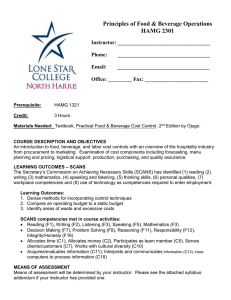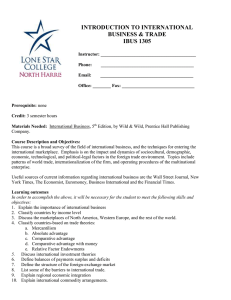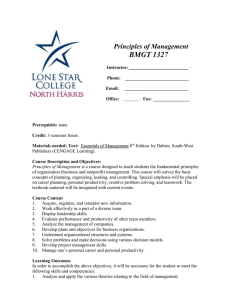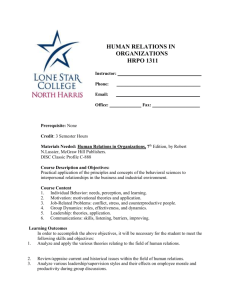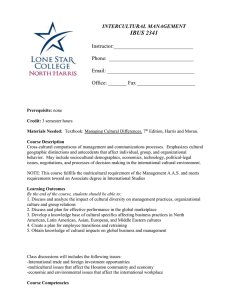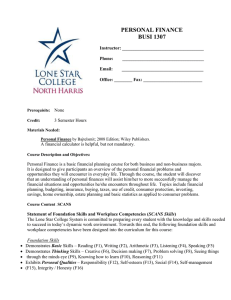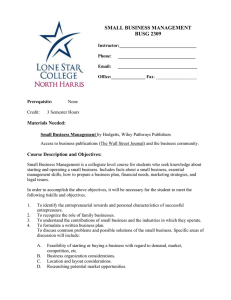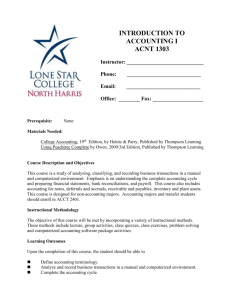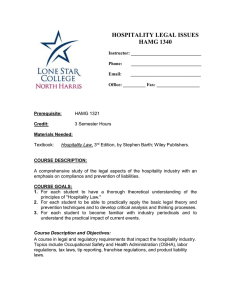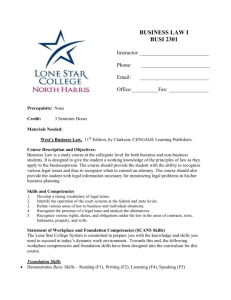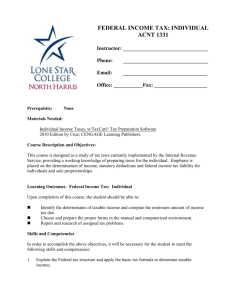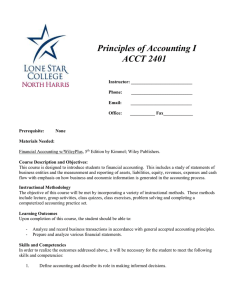organizational behavior hrpo 2307
advertisement
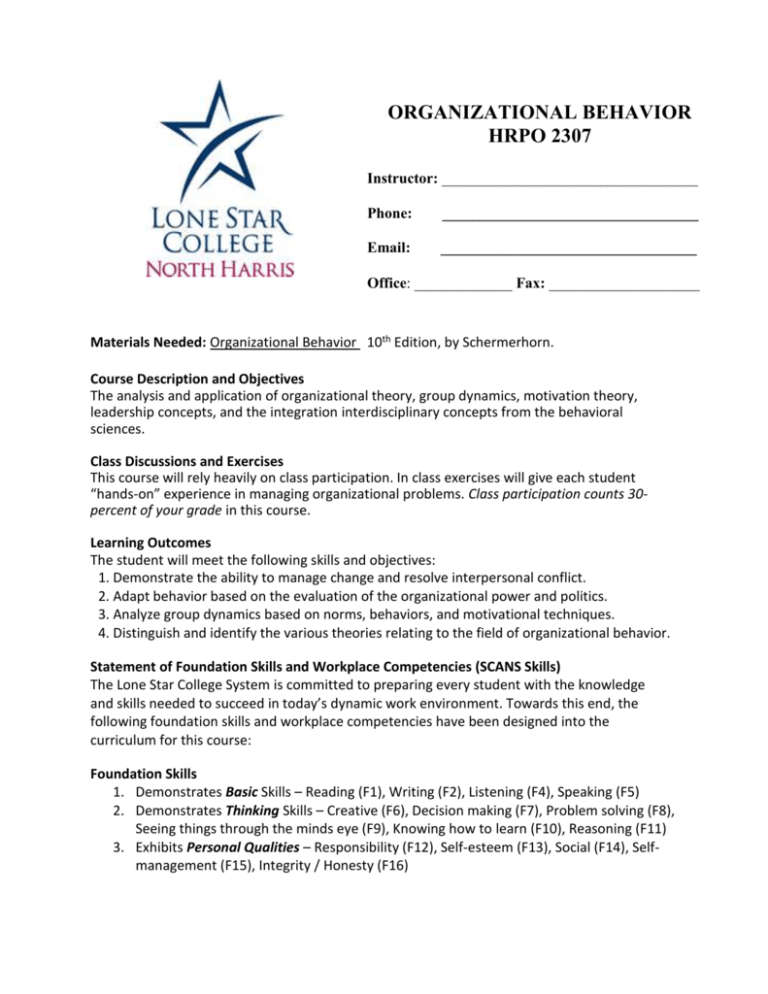
ORGANIZATIONAL BEHAVIOR HRPO 2307 Instructor: __________________________________ Phone: __________________________________ Email: __________________________________ Office: _____________ Fax: ____________________ Materials Needed: Organizational Behavior 10th Edition, by Schermerhorn. Course Description and Objectives The analysis and application of organizational theory, group dynamics, motivation theory, leadership concepts, and the integration interdisciplinary concepts from the behavioral sciences. Class Discussions and Exercises This course will rely heavily on class participation. In class exercises will give each student “hands-on” experience in managing organizational problems. Class participation counts 30percent of your grade in this course. Learning Outcomes The student will meet the following skills and objectives: 1. Demonstrate the ability to manage change and resolve interpersonal conflict. 2. Adapt behavior based on the evaluation of the organizational power and politics. 3. Analyze group dynamics based on norms, behaviors, and motivational techniques. 4. Distinguish and identify the various theories relating to the field of organizational behavior. Statement of Foundation Skills and Workplace Competencies (SCANS Skills) The Lone Star College System is committed to preparing every student with the knowledge and skills needed to succeed in today’s dynamic work environment. Towards this end, the following foundation skills and workplace competencies have been designed into the curriculum for this course: Foundation Skills 1. Demonstrates Basic Skills – Reading (F1), Writing (F2), Listening (F4), Speaking (F5) 2. Demonstrates Thinking Skills – Creative (F6), Decision making (F7), Problem solving (F8), Seeing things through the minds eye (F9), Knowing how to learn (F10), Reasoning (F11) 3. Exhibits Personal Qualities – Responsibility (F12), Self-esteem (F13), Social (F14), Selfmanagement (F15), Integrity / Honesty (F16) Workplace Competencies 1. Manages Resources – Allocates time (C1), Allocates human resources (C4) 2. Exhibits Interpersonal Skills – Participates as team member (C5), Teaches others (C6), Exercises leadership (C8), Negotiates to arrive at decisions (C9), Works with cultural diversity (C10) 3. Manages Information – Acquires and evaluates (C11), Organizes and maintains (C12), Interprets and Communicates (C13) 4. Uses Systems and Technology – Understands systems (C15), Monitors and corrects performance (C16), Improves and designs systems (C17), Applies technology to task (C19), Maintains and troubleshoots (C20) Means of Assessment Means of Assessment will be determined by your instructor. Please see the attached Syllabus Addendum if your instructor has provided one. Evaluation Policies and Procedures Your instructor will supply detailed testing and grading procedures. If you stop attending class, you must withdraw at the Admissions Office before the official drop date. Failure to do so will result in a grade of ‘F’ for the course. Attendance and Participation Policies Class attendance is important. Generally, the course material is covered in the textbooks; however, lectures and small group exercises augment and clarify the textbook material. You are encouraged to get to know your fellow students in order to have a source for lecture notes and handouts if you cannot attend a class session. Students are expected to assume the responsibility for learning. Your instructor will assist you, but the actual responsibility rests with you. Students are also expected to devote their energy to attaining the skills and knowledge required for their particular career goals. The Lone Star College System Policy & Procedure Manual [Student Conduct, Section 562.0ld] states, “Disruptive activity that hinders other students’ learning or deters an instructor from effective teaching will not be tolerated under any circumstances.” To provide equal-opportunity learning situation for all students enrolled in this class, children are not allowed in the labs or classrooms. Academic Integrity The college’s academic integrity policy states, the Lone Star College System is committed to a high standard of academic integrity in the academic community. In becoming a part of the academic community, students are responsible for honesty and independent effort. Failure to uphold these standards includes, but is not limited to, the following: 2 1. 2. 3. 4. Plagiarizing written work projects. Cheating on exams or assignments. Collusion on an exam or project. Misrepresentation of credentials or prerequisites when registering for a course. Virus Protection The college will not be held liable for any corruption of data caused by virus contamination. The college computers are regularly screened and are protected against computer viruses to the best of our ability. However, we do not guarantee that viruses do not exist on our systems. Procedures are in place in all labs for you to scan your diskettes. It is your responsibility to protect your data from corruption due to viruses. Student Services Library The Library at each college provide print and non-print resources and services for students. The materials have been selected to serve the curricular, vocational, and recreational needs of the college community. Each college provides computer access to a variety of information in electronic form including bibliographic indexes to journals, Internet resources, and multimedia publications. Learning Support Centers Learning Support Center at each college provide print and audio-visual materials as well as tutorial assistance and computer labs for students who need academic support services. Materials from other disciplines are available in each center including reading, writing, math and college study skills. Internet & E-mail The Lone Star College System provides computing and network resources to students. Students are encouraged to use the computers, software packages, and electronic mail (e-mail), for educational or System-related activities and to facilitate the efficient exchange of useful information. However, the equipment, software and network capacities provided through the System computer services are and remain the property of the System, and access may be denied to any student who fails to comply with the System’s policies and procedures regarding its use. Access to the System’s e-mail and similar electronic communication systems are a privilege and certain responsibilities accompany that privilege. System users are expected to demonstrate the same level of ethical and professional manner, as is required in face-to-face or written communications. Anonymous or forged messages will be treated as a violation of this policy. Equal Opportunity Statement It is the policy of the Lone Star College System to provide equal employment, admission and educational opportunities without regard to race, color, religion, national origin, sex, age or disability. 3 Lone Star College System strives to provide an excellent learning environment free from harassment or intimidation directed at any person’s race, color, religion, national origin, sex, age, or disability. Any form of harassment will not be tolerated. ADA Statement The Lone Star College System is dedicated to providing the least restrictive learning environment for all students. The college system promotes equity in academic access through the implementation of reasonable accommodations as required by the Vocational Rehabilitation Act of 1973, Title V, Section 504 and the Americans with Disabilities Act of 1990 (ADA) which will enable students with disabilities to participate in and benefit from all post-secondary educational activities. If you require reasonable accommodations because of physical, mental, or learning disability, please notify the instructor of this course as soon as possible and preferably before the end of the first two weeks of class to arrange for reasonable accommodations. Guaranteed Graduate Policy The Lone Star College System guarantees that graduates of its Associate of Arts, Associate of Science, or Associate of Applied Science and all Certificate programs, will provide under certain circumstances, additional education and training tuition free to students lacking appropriate master of specified competencies. Drops/Excessive Absences: Under Section 51.907 of the Texas Education Code, "an institution of higher education may not permit a student to drop more than SIX courses, including any course a transfer student has dropped at another Texas public institution of higher education." This statute was enacted by the State of Texas in Spring2007 and applies to students who enroll in a public institution of higher education as first-time freshmen in the Fall 2007 semester or later. Students enrolled prior to Fall 2007 are not affected. Any course that a student drops is counted toward the sixcourse limit unless the student is completely withdrawing from the institution or meets one of the eligible criteria for a waiver. A "drop" in this instance is considered when a student is dropped or withdrawn from a course after official day resulting in a grade of "W." Please refer to the catalog for any additional information regarding the eligible criteria for a waiver. For additional information, refer to the Lone Star College System catalog. 4
